| | Return to Local Producer Profiles | Contact Us
Peter and Judy Haase run Buffalo Horn Ranch in Mountain View County, north west of Olds. They currently run 175 bison, 50 of which are bison cows. Their bison are all pure plains bison, not cross bred with wood bison, as they try to maintain pure plains bison as a species.
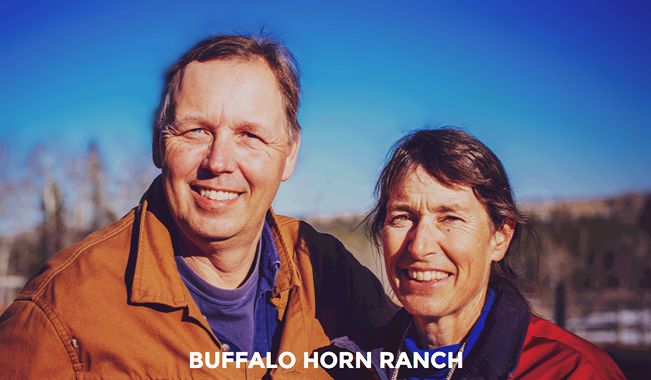
Buffalo Horn Ranch bison meat is available at Bearspaw Farmers' Market, Cochrane Farmers' Market, Twisted Basil, Forage Farm to Fork Foods and directly from the ranch. More information on how to order their products can be found on their website.
Why they started Buffalo Horn Ranch
In the early 1990s, Peter and Judy were living in Calgary. Peter was working as a professional photographer and Judy was a teacher when they decided they wanted an alternative lifestyle and they turned to their agricultural roots. Peter's family had farmed a traditional mixed farm in Germany for 900 years and Judy's family had a farm in Mountain View county which had been named “Buffalo Horn Ranch” in 1970 when Judy's father bought the land as a hobby farm.
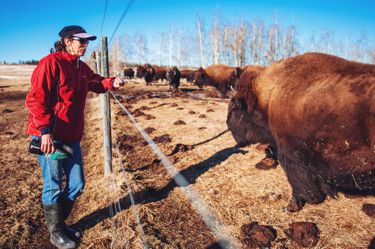
When they began researching different animals to raise at Buffalo Horn, they kept coming back to bison and felt that it was not only a good match for their personalities, but the land's history as well. When Judy's family was originally looking to purchase the land, they found a bison skull and several bison horns. To bring the bison back (to what had been their native habitat) felt right to Peter and Judy and they began their journey towards the prosperous farming environment that Buffalo Horn has become.
Peter and Judy now sell the best few animals for breeding and the majority for meat. From the tongue to the tail and everything in between, they sell individual cuts, sides and quarters. They also sell four to six winter hides each year as well as skulls, a few head mounts and jewellery that Judy makes from bones and teeth.
Their role in the community
When Peter and Judy got into the industry in 1994 not many people were raising bison (which were virtually extinct at the time). Bison meat has been off the menu for over a hundred years but through education, industry resources, and community support they've helped to put it on the menu again both in their community and the global market.
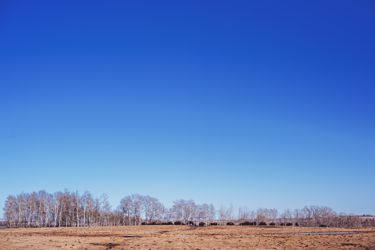
It took a lot of public education in the beginning. They worked closely with the Bison Association at events across the province, talking to people about the good qualities of bison. Their message was, and continues to be, that the bison meat is high in the good, low in the bad, and tastes great. They've seen their customer community grow as they're informed that bison meat is lower in calories, higher in protein and leaner with a full flavour.
The educational aspect of their ranch continues to be an important part of their work as the movement towards urban living has removed many Canadians from the farming experience. It's important for the public to see Buffalo Horn Ranch for themselves, to connect with the land and with the bison that live there. Peter and Judy not only welcome visitors from the community to their ranch but also offer tours for international visitors who want to experience a bison farm. In addition to on farm visits, Buffalo Horn has worked with Olds College to give students the opportunity to learn more about raising bison.
Through their involvement in the Slow Food movement, they have had the opportunity to represent the Canadian Bison industry at events in Italy where they can connect with thousands of other small scale farmers from 150 different countries. In such a niche industry, the opportunity to engage with producers doing different kinds of agriculture all over the world is unique and incredibly valuable.
Their relationships with their customers and accessing Buffalo Horn Ranch products
There is growing awareness in producers, and in the food industry in general, that people want their meat to be less manipulated than it has been in the past. The bison at Buffalo Horn Ranch are always raised free range with room to roam, which happy healthy bison need. The animals have a primarily forage based diet of pasture grass and hay in the winter. They also raise the bison without growth hormones, antibiotics or steroids. People want to know that the animals they're eating are raised as closely to their natural state as possible.
The majority of their customers are health conscious, urban individuals who care about where their meat comes from and how it's raised. Farmers' markets are the single biggest local food channel used to connect with their consumers but since the markets Buffalo Horn Ranch attend are seasonal (Bearspaw Farmers' Market & Cochrane Farmers' Market), Peter and Judy run a home delivery option to Calgary once a month in the off-season for their customers who eat bison as a regular part of their diet.
They've been attending the Cochrane Farmer's Market for 16 years now and have made strong relationships with their customers, finding common ground in their values, philosophies, ideas and even in the activities they enjoy.
Being able to interact one-on-one with their customers through farmers' markets has led to them forging friendships with their consumer community. They enjoy really getting to know their customers and learning what products they're looking for. Knowing their customers this personally and building trust and community is essential for Peter and Judy.
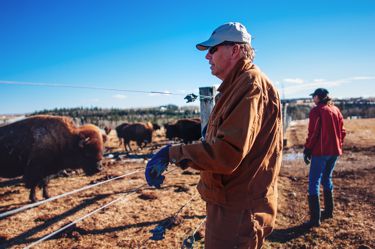
Their vision for Buffalo Horn Ranch
Healthy, happy animals are at the forefront of Buffalo Horn Ranch. They recognize that bison are a unique and intriguing animal within the local meat industry and they try to respect and maintain their wildness as much as they can. They run their bulls with the cows year round and allow the bison's natural breeding cycle to dictate the pace and schedule of their farming practices. Bison, as opposed to many other domestic meat animals, have been largely unaltered by domestication and are still imbued with strong, natural instincts within their environment.
“We try to deal with the animals in as natural a way as possible and in as low stress a way as possible. They're free to be bison, as bison should be.” - Judy Haase
. |
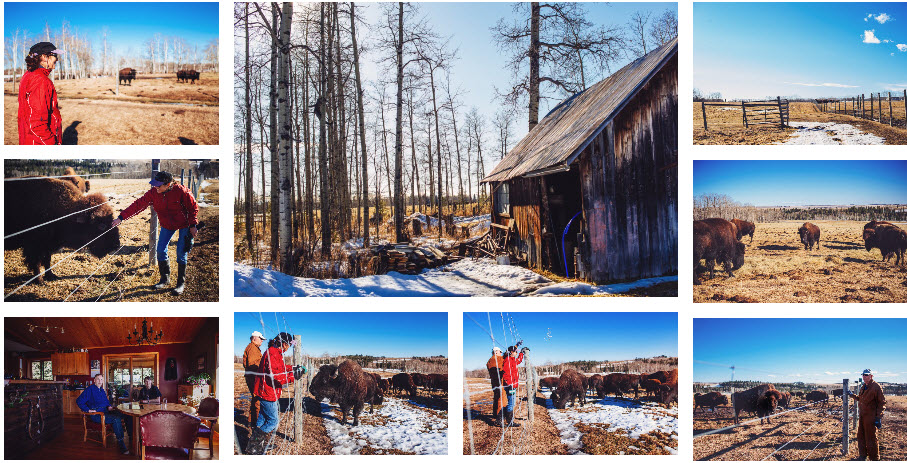
 |
|